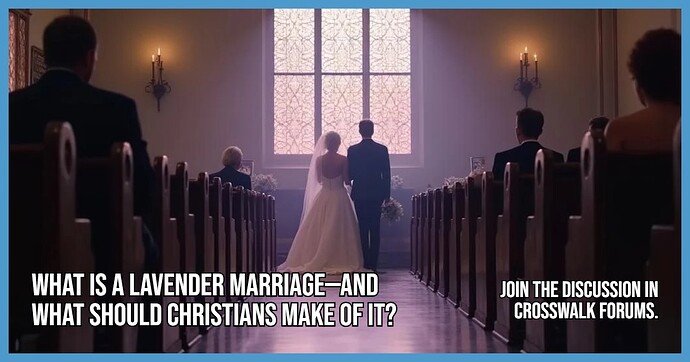What Is a Lavender Marriage—And What Should Christians Make of It?
As Christians reflect on truth, identity, and integrity in relationships, we invite your voice in Crosswalk Forums.
#MarriageAndFaith #ChristianEthics #christianforums #crosswalkforums #forums #crosswalk #faithcommunity #faithforums
The term lavender marriage might sound poetic, but its meaning reveals a deep and complex social dynamic. Historically, a “lavender marriage” referred to a union between a man and woman—typically one or both being homosexual—arranged to disguise their true sexual orientation, especially in eras or industries where being openly gay could destroy one’s career, reputation, or safety. These marriages were common in early Hollywood and remain present today in certain cultures, religious communities, and even political spheres.
But as societal views on sexuality shift and the cultural costs of being “out” lessen in some parts of the world, the idea of lavender marriages still raises difficult moral and theological questions for Christians.
Some believers may see it as a strategic way for someone with same-sex attraction to remain publicly aligned with traditional values. Others view it as fundamentally dishonest—an arrangement that distorts the purpose of marriage, which is to reflect the covenantal love of Christ and the Church, grounded in truth and mutual self-giving.
Biblically speaking, marriage is designed to be more than just companionship or public appearance—it is meant to be a union of hearts, bodies, and lives (Genesis 2:24, Ephesians 5:25–32). But what happens when someone feels caught between honoring biblical teaching and their own internal struggles, social expectations, or family pressures?
Some Christian circles have debated whether such marriages are a form of self-denial in pursuit of holiness, or whether they amount to self-deception and the denial of others’ agency—especially the heterosexual spouse who may enter the marriage unaware or unable to fulfill their God-given design for intimacy and unity.
These questions also touch on bigger issues:
- Is authenticity more important than appearances?
- Can a marriage still honor God if it’s not romantically or sexually reciprocal?
- Is it ever moral to enter a marriage primarily to avoid judgment, suspicion, or marginalization?
- How should the Church respond if such marriages are discovered—or if individuals feel compelled to pursue them?
This isn’t just theoretical—there are real people in pews, pulpits, and ministries wrestling with these choices.
So we ask:
What do you think about the concept of lavender marriages?
Can such unions ever be justified biblically, or are they always a compromise?
How should Christians walk with love and truth when this topic arises in our communities?
